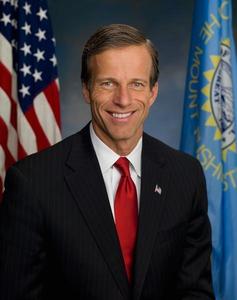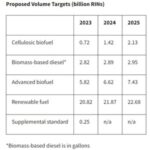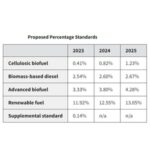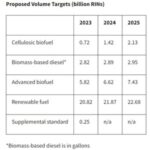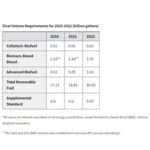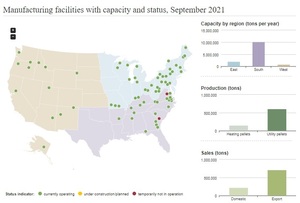Senators urge EPA to issue a strong RFS ‘set’ rule
Energy Disrupter
ADVERTISEMENT
A bipartisan group of senators, led by Sens. John Thune, R-S.D., and Dick Durbin, D-Ill., on Oct. 19 sent a letter to U.S. EPA Administrator Michael Regan urging the agency to establish robust and expanded renewable volume obligations (RVOs) in its upcoming Renewable Fuel Standard “set” rule.
The senators said strong RVOs will be bolstered by numerous incentives and investments that are poised to increase biofuel blending and further reduce the carbon intensity of these fuels. They also request that the EPA take supportive actions to provide regulatory certainty and afford new opportunities for homegrown biofuels.
“Through this rulemaking, EPA has a historic opportunity to not only reinforce its efforts to restore integrity to the RFS, but chart a new course for biofuels that will help meet America’s diverse energy demands while further decarbonizing numerous sectors of our economy,” the senators wrote.
In setting RVOs for 2023 and later years, the senators stress that the EPA can justify ambitious blending targets by leveraging recently extended and expanded incentive structures. These incentives include the newly established sustainable aviation fuel (SAF) production tax credit and clean fuels tax credit, along with expanded credits for carbon capture and storage (CCS).
“Together, these credits will incentivize continued low-carbon renewable fuel blending, providing significant value to consumers while maintaining a critical market for our farmers and generating a key source of high-quality animal feed and other value-added co-products,” the senators wrote.
The senators also caution that new fuels, like SAF, and the agency’s expected move to allow for electric renewable identification numbers (e-RINs) must be accommodated in a way that is additive to existing fuel technologies and previous blending targets. They must also be subject to the same transparency, integrity, and lifecycle analysis standards as other renewable transportation fuels, according to the senators. “Failure to do so will displace biofuels that have been foundational to decarbonizing the transportation sector, leave additional environmental gains on the table, and hinder industry growth,” they wrote. The senators specifically request that the EPA set the RVO for conventional biofuels above 15 billion gallons. They also urge the EPA to set advanced biofuel RVOs that account for increased production of SAF and renewable diesel, and ensure that RINs for emerging technologies and e-RINs are additive to existing volumes.
In addition, the senators are calling on the EPA to approve long-pending RFS fuel registration applications and pathway petitions, including those for corn kernel fiber; account for expected expansions in biofuels infrastructure for higher level blends; ensure the availability of year-round E15 sales; and update lifecycle emissions modeling for biofuels using the U.S. Department of Energy’s GREET model.
In addition to Thune and Durbin, the letter is signed by Sens. Tammy Baldwin, D-Wis.; Sherrod Brown, D-Ohio; Tammy Duckworth, D-Ill.; Joni Ernst, R-Iowa; Deb Fischer, R-Neb.; Chuck Grassley, R-Iowa; Amy Klobuchar, D-Minn.; Roger Marshall, R-Kan.; Gary Peters, D-Mich.; Mike Rounds, R-S.D.; and Tina Smith, D-Minn.
The Renewable Fuels Association, Growth Energy and American Coalition for Ethanol are thanking the senators for their support of a strong RFS “set” rule.
“With the forthcoming ‘set’ rule, EPA has a golden opportunity to stimulate further growth in low-carbon fuel use and build on the successes of the Renewable Fuel Standard,” Geoff Cooper, president and CEO of the RFA. “We appreciate the efforts of Senator Thune, Senator Durbin, and other stalwart renewable fuel supporters to ensure EPA issues a ‘set’ rule that furthers the environmental and economic objectives of the original RFS program.”
“As we near EPA’s announcement on the proposed Set rule, ACE applauds these senators for their timely, bipartisan letter urging the agency to utilize this historic opportunity to increase biofuel blending targets and take other important steps to leverage the role low carbon biofuels can and should play to address our nation’s energy demands and meet the Administration’s decarbonization goals,” said Brian Jennings, CEO of ACE.
“New incentives enacted by Congress will boost investments in clean fuel technologies that support action by EPA to expand the use of clean fuels like ethanol through future RFS targets,” Jennings continued. “EPA has the power to dramatically bolster the trajectory of biofuels by taking the senators’ recommendations, which will provide the regulatory certainty needed to chart a new path forward to grow demand for biofuels.”
“A stronger RFS means more savings at the pump for working families, lower carbon emissions, and greater U.S. energy security,” said Emily Skor, CEO of Growth Energy. “We’re grateful to Senators Durbin, Thune, and other clean energy champions working to deliver the regulatory certainty we need to fast-track growth in the U.S. bioeconomy and shield motorists from volatile global oil prices.
“This is a vital opportunity to drive transformative progress in low-carbon transportation, and we look forward to working with EPA Administrator Regan, the White House, and leaders on Capitol Hill to tap the full potential of the RFS as a climate and energy solution,” Skor continued.
A full copy of the letter can be downloaded from Thune’s website.

